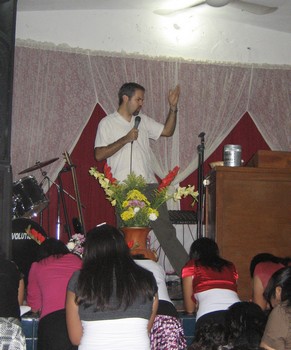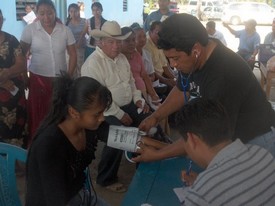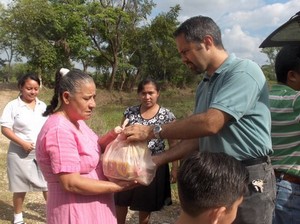I don’t consider myself a builder. I’ve never created anything that I can remember, except maybe the lopsided pencil holder that I made for my mom in my Boy Scouts basket weaving merit badge class. Still, I can tell when things aren’t quite right. That’s exactly Pastor Rudy Manzano noticed shortly after he took the pastorate of “El Tabernaculo” church in Yaxkukul. The roof above his congregation was bulging in the middle, a sure sign that things were amiss.
He spoke with an engineer about his problem and asked him to give him his opinion. What he had to say was not what he wanted to hear. The beams that held the roof in place had not been cured correctly. Therefore, they were unable to hold the weight of the blocks and the cement used in its construction. The roof was in danger of collapse. It had to go and soon.
So the congregation tore down the roof. The danger has passed, but now they face a problem. The rains are on their way. Beginning in May, the Yucatán receives rains almost each afternoon, and hurricane season from July through November means that it will be months before this congregation will have a building to call their home.
Kelly, the kids, and I had a chance to visit the site on Sunday. Being the type of person that likes to worship outdoors, I found the service under the blue skies to be a welcome change from the traditional unfinished concrete structures that characterize so many Assemblies of God churches here in the Southeast. Still, I knew that my breath of fresh air was a day-to-day burden for Pastor Rudy and his congregation.
I preached on faith, from Mark 7:24-30 the story of the Syrophoenician Woman, and I spoke on resolutely seeking after God. In the passage, the woman surpassed the spiritual understanding of even Jesus’s disciples as her response to a supposed rebuff revealed a truly amazing faith.
Many times we feel that obstacles are things to be avoided. Pain and suffering are products of bad choices, or even worse, sin. But in Mark 7, and I venture to say in the situation in Yaxkukul, that isn’t the case. Suffering in the case of Syrophoenician Woman caused her to resolutely seek an audience with Jesus and not be put off until she had her response. In the same way, I see the loss of this congregation’s roof as an opportunity for them to see the hand of God moving in their lives.
We had a chance to speak with the Pastor Rudy and his wife Laura at length following the service, and we found them upbeat in the face of this situation. It didn’t take long to find out why. Their oldest daughter, now attending high school had battled years before with a life threatening case of pneumonia. The strength they found in their faith brought them through that crisis. Now, they wait patiently on God knowing that He will yet again provide.
The wonderful thing about the family of God is that we have an opportunity in this situation as well. We can be an instrument of God’s provision for this congregation. The people of Yaxkukul are doing what they can, but it will take time for this group to get together the $13,000 that they will need to finish the work, time that they do not have.
Would you consider being a part? If you would like to donate directly to this work, you can give through this secure web-server by entering your offering and the project name and number “RECONSTRUCTION OF CHURCH ROOF TABERNACULO” #14312.”
For pictures of the project click here.














